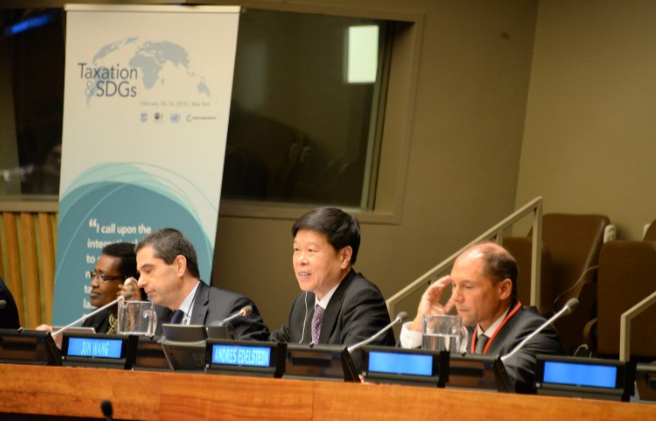
Wang Jun (middle), Director of the State Administration of Taxation of China, addressed the UN conference on February 14, 2018. Photo: Yin Miao
New York (People’s Daily) – The Platform for Collaboration on Tax (PCT) is holding its first Global Conference on Taxation at the United Nations in New York, and will run through February 16.
During the three-day conference, 450 officials from tax and administration departments all over the world, as well as representatives of major international organizations, academics, economic and civic groups will be in attendance.
The conference, organized by the PCT, the International Monetary Fund (IMF), the Organization for Economic Co-operation and Development (OECD), along with the UN and the World Bank, will provide a unique opportunity to address relevant topics such as alleviating poverty, protecting the planet, and ensuring prosperity.
The conference will also focus on efforts to mobilize domestic resources for development; the role taxes play in supporting sustainable economic growth; investment and trade; the social dimensions of taxation (income and gender inequality and human development); as well as development capacity and international tax cooperation.
The conference aims to provide guidance on how to better target tax efforts to achieve broader development goals. Insights from the conference will help inform and shape the future work of the PCT members and partners, including the IMF, OECD, UN and World Bank.
Using the strategy adhering to the new development proposed by the 19th National Congress of the CPC, and by continuing to implement the strategic plan and requirements for sustainable development, integrating taxation efforts into the overall development of the country, tax authorities in China have supported their role in sustainable development.
According to Wang Jun, director of the State Administration of Taxation of China, China utilizes six taxation methods that support sustainable development.
Utilizing a green tax system that includes multiple adjustments, and by supporting innovative growth since 2012, China's tax reforms have accumulated more than 2-trillion yuan in tax reductions, boosting entrpreneurial.
China has implemented balanced tax policies to support western-region development, northeast industrial base revitalization, and increased development in Central China.
Bilateral cooperation on tax revenue efforts with 117 countries and regions, has created created more international tax opportunities.
China also promotes and shares achievements that have helped more than 66 million poor people climb out of poverty.
Optimizing business environments while deepening management and administration reforms within tax departments has worked well. China has strengthened state and government cooperation, and has reduced the amount of time once spent on tax collecting.
China's practices, achievements, and initiatives supporting sustainable development through tax revenue measures were met with a favorable response by the attending delegates.


